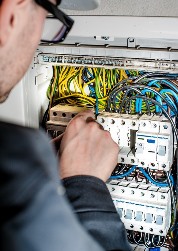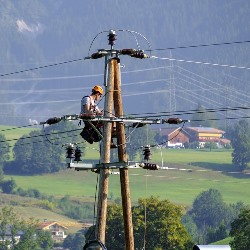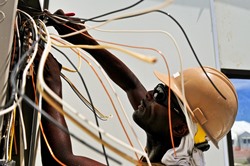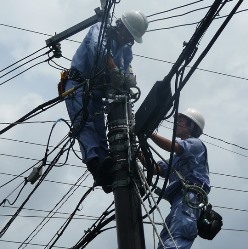How to Find the Best Electrician Vocational School near Burns Oregon
 The initial step to becoming an electrical contractor or tradesman is enrolling in an electrician trade school near Burns OR. But with so many vocational schools to choose from, just how do you undertake making certain that you enroll in the right one? Particularly since there are so many factors to evaluate. For instance, many prospective students will start by looking for schools that are close to their residence. Once they have located some that are within driving range, they will select the one with the most affordable tuition. Although cost and location are important, they are not the sole factors that must be considered. Also important are the accreditation and reputations of the schools, as well as their graduation and job placement rates. These and additional qualifications should help mold your final decision when selecting an electrician trade school. We will cover that checklist in more detail later in this article. But to begin with, let’s talk a little bit about becoming an electrician and the instructional options that are available.
The initial step to becoming an electrical contractor or tradesman is enrolling in an electrician trade school near Burns OR. But with so many vocational schools to choose from, just how do you undertake making certain that you enroll in the right one? Particularly since there are so many factors to evaluate. For instance, many prospective students will start by looking for schools that are close to their residence. Once they have located some that are within driving range, they will select the one with the most affordable tuition. Although cost and location are important, they are not the sole factors that must be considered. Also important are the accreditation and reputations of the schools, as well as their graduation and job placement rates. These and additional qualifications should help mold your final decision when selecting an electrician trade school. We will cover that checklist in more detail later in this article. But to begin with, let’s talk a little bit about becoming an electrician and the instructional options that are available.
Click Here to Get Free Information on Electrician Schools Near You!
Electrician Certificate, Diploma and Degree Options
 There are three general ways to get electrician instruction in a technical or vocational school near Burns OR. You can enroll in a diploma or certificate program, or receive an Associate Degree. Bachelor’s Degrees are available at certain schools, but are not as prevalent as the first three options. Frequently these programs are made available together with an apprenticeship, which are mandated by the majority of states to be licensed or if you would like to become certified. Bellow are short explanations of the three most common programs available.
There are three general ways to get electrician instruction in a technical or vocational school near Burns OR. You can enroll in a diploma or certificate program, or receive an Associate Degree. Bachelor’s Degrees are available at certain schools, but are not as prevalent as the first three options. Frequently these programs are made available together with an apprenticeship, which are mandated by the majority of states to be licensed or if you would like to become certified. Bellow are short explanations of the three most common programs available.
- Diploma and Certificate Programs are typically provided by Oregon trade and technical schools and require approximately a year to complete. They furnish a good foundation and are geared towards students who wish to join an apprenticeship more quickly as a journeyman electrician.
- Associate Degree Programs take two years to finish and are offered by Oregon community colleges, typically as an Associate Degree in Electrical Technology. They furnish a more comprehensive education while providing the foundation that readies students to join their apprenticeship program.
As previously stated, Bachelor’s Degrees are available at certain Oregon institutions, but are less popular at 4 years than the other briefer programs. The majority of states mandate that an apprenticeship of at least 2 years and in most cases four years be completed before licensing. Therefore, most students are eager to commence their paid apprenticeship, particularly if it’s not a component of their academic program.
Electrician Certification and Licensing Requirements
 Electricians in Burns OR can carry out a vast array of services, including testing, installing and replacing electrical systems, and ensuring that the wiring in houses and buildings are up to code standards. After concluding an apprenticeship, journeyman electricians are mandated to be licensed in the majority of states or municipalities. The duration of apprenticeship differs by state, but typically about 4 to 5 years of practical experience is needed before taking the licensing examination. The exams commonly evaluate electrical theory and general knowledge, in addition to understanding of the National Electrical Code (NEC). Receiving certification is also a voluntary means for an electrician to distinguish her or himself as a skilled and experienced professional. The certifications offered differ by state and can be acquired in many specialties, such as cable splicing as an example. The certification process usually involves three levels of competency:
Electricians in Burns OR can carry out a vast array of services, including testing, installing and replacing electrical systems, and ensuring that the wiring in houses and buildings are up to code standards. After concluding an apprenticeship, journeyman electricians are mandated to be licensed in the majority of states or municipalities. The duration of apprenticeship differs by state, but typically about 4 to 5 years of practical experience is needed before taking the licensing examination. The exams commonly evaluate electrical theory and general knowledge, in addition to understanding of the National Electrical Code (NEC). Receiving certification is also a voluntary means for an electrician to distinguish her or himself as a skilled and experienced professional. The certifications offered differ by state and can be acquired in many specialties, such as cable splicing as an example. The certification process usually involves three levels of competency:
- An experience requirement
- Passing a written exam
- Passing a practical exam
Examples of certifying organizations include the National Joint Apprenticeship and Training Committee (NJATC) along with the National Institute for Certification in Engineering Technologies (NICET). It’s important that the electrician vocational school that you select not only provides a solid academic foundation, but also helps prep you for passing any certification and licensing exams that you may need to take in the future.
Enrolling in Electrician Programs Online
 An alternative that you might have considered is selecting an online electrician program to earn a degree or a certificate. Even though online schools have become more accepted as a means of attending class without the need for travel, in this instance they are not totally internet based. Just about all electrician schools require partial attendance on-campus to receive practical hands-on training. But since the rest of the classes may be attended online, distance learning might be a more practical choice for students that have minimal time for schooling. And as an added benefit many online training programs have a cheaper tuition cost compared to their traditional alternatives. Driving costs from Burns OR are also reduced and a portion of the study materials can be accessed on line also. All of these benefits can make online electrician tech schools more economical and convenient. And many are fully accredited, which we will deal with in our questions to ask checklist.
An alternative that you might have considered is selecting an online electrician program to earn a degree or a certificate. Even though online schools have become more accepted as a means of attending class without the need for travel, in this instance they are not totally internet based. Just about all electrician schools require partial attendance on-campus to receive practical hands-on training. But since the rest of the classes may be attended online, distance learning might be a more practical choice for students that have minimal time for schooling. And as an added benefit many online training programs have a cheaper tuition cost compared to their traditional alternatives. Driving costs from Burns OR are also reduced and a portion of the study materials can be accessed on line also. All of these benefits can make online electrician tech schools more economical and convenient. And many are fully accredited, which we will deal with in our questions to ask checklist.
Points to Ask Electrician Vocational Schools
 Once you have made a decision to earn a certificate, diploma or degree, you can start to refine your school options. Considering that there are so many electrician vocational and trade schools in the Burns OR area, it’s important to have a checklist of qualifications that each program must satisfy. The first two that we talked about were location and the cost of tuition. If you are interested in earning an degree online, then that must be an option that your chosen school offers. And although all three qualifiers may be crucial when making your selection, there are additional variables that must be considered as well. Following is a checklist of those additional qualifiers that you will need to assess before selecting an electrical technical school.
Once you have made a decision to earn a certificate, diploma or degree, you can start to refine your school options. Considering that there are so many electrician vocational and trade schools in the Burns OR area, it’s important to have a checklist of qualifications that each program must satisfy. The first two that we talked about were location and the cost of tuition. If you are interested in earning an degree online, then that must be an option that your chosen school offers. And although all three qualifiers may be crucial when making your selection, there are additional variables that must be considered as well. Following is a checklist of those additional qualifiers that you will need to assess before selecting an electrical technical school.
Accreditation. A large number of electrician technical schools have earned either a regional or a national accreditation. They may receive Institutional Accreditation, which focuses on the school’s programs overall, or Programmatic Accreditation, which relates to a specific program, such as electrical technology. Make certain that the Burns OR school and program are accredited by a U.S. Department of Education acknowledged accrediting organization, such as the Accreditation Board for Engineering and Technology. Along with helping guarantee that you receive a quality education, it can help in obtaining financial aid or student loans, which are frequently unavailable for non-accredited programs. Additionally, some states require that the electrician training course be accredited in order to qualify for licensing.
High Completion and Placement Rates. Ask the electrician training programs you are reviewing what their completion rates are. The completion rate is the percentage of students who enroll in and finish the program. A low completion rate could indicate that students were unhappy with the course and quit. It could also indicate that the instructors were not competent to instruct the students. It’s similarly imperative that the schools have higher job placement rates. Older and/or more reputable schools may have a more extensive list of graduates, which may mean more contacts for the school to use for their apprenticeship and job placement programs. A high job placement rate can not only affirm that the school has an excellent reputation within the field, but also that it has the network of contacts to assist Burns OR graduates obtain apprenticeships or employment.
Apprenticeship Programs. Most electrician vocational programs are taught in conjunction with an apprenticeship or an internship program. Those participating technical and vocational programs will help place you in an apprenticeship program inside their network of electrician companies or labor unions. Ask if the schools you are comparing have referring relationships with Burns OR area electricians or electrical contractors. An apprenticeship not only provides a rewarding experience by supplying practical training, but it also furnishes employment opportunities and helps to form relationships in the area electrician professional community.
Modern Facilities. Confirm that the campus facilities and the equipment that you will be trained on are up-to-date and what you will be working with in the field. If you are currently in an internship or an apprenticeship, check with the electrical tech you are working with concerning what you should be looking for. Otherwise, ask a local Burns OR electrical company if they can give you some tips. Additionally keep in mind that unless you can relocate, the school must be within driving distance of your Burns home. Remember that if you decide to attend an out-of-state school, besides the added relocation costs there might be increased tuition fees compared to in-state residents.
Smaller Classes. It’s important that you get as much personalized training as possible, which can be difficult in larger classes. Ask if you can sit in on some of the classes so that you can observe how big they are and experience the interaction between students and teachers. Speak to several of the students and get their feedback concerning class sizes and instruction. Last, talk with a few of the instructors and learn what their level of experience is and what certifications or degrees they have earned.
Flexible Scheduling. Make sure that the class schedules for the programs you are assessing are flexible enough to handle your needs. If you are only able to go to classes at night or on weekends near Burns OR, verify that the programs you are looking at provide those choices. If you can only attend part-time, make sure that the school you select allows part-time enrollment. Additionally, ask what the protocol is to make-up classes should you miss any due to work, illness or family responsibilities.
Electrician Schools Online Burns Oregon
 Choosing the best electrical trade school will probably be the most critical decision you will make to begin your new career. You originally came to this website due to an interest in Electrician Schools Online and wanting more information on the topic Train To Be An Electrician. But as we have discussed in this article, there are several factors that you will need to examine and compare between the training programs you are considering. It’s a prerequisite that any electrical training that you are reviewing includes a considerable amount of hands-on instruction. Classes need to be smaller in size and every student should have their own equipment to train with. Classroom instruction needs to provide a real-world context, and the curriculum should be up-to-date and in-line with industry standards. Courses differ in duration and the kind of credential offered, so you will have to determine what length of program and certificate or degree will best serve your needs. Every training program provides unique possibilities for certification also. Probably the best way to research your final list of schools is to check out each campus and speak with the faculty and students. Take the time to attend a few classes. Inspect the campus and facilities. Make sure that you are confident that the school you decide on is the right one for you. With the proper training, hard work and dedication, the final outcome will be a new career as a professional electrician in Burns OR.
Choosing the best electrical trade school will probably be the most critical decision you will make to begin your new career. You originally came to this website due to an interest in Electrician Schools Online and wanting more information on the topic Train To Be An Electrician. But as we have discussed in this article, there are several factors that you will need to examine and compare between the training programs you are considering. It’s a prerequisite that any electrical training that you are reviewing includes a considerable amount of hands-on instruction. Classes need to be smaller in size and every student should have their own equipment to train with. Classroom instruction needs to provide a real-world context, and the curriculum should be up-to-date and in-line with industry standards. Courses differ in duration and the kind of credential offered, so you will have to determine what length of program and certificate or degree will best serve your needs. Every training program provides unique possibilities for certification also. Probably the best way to research your final list of schools is to check out each campus and speak with the faculty and students. Take the time to attend a few classes. Inspect the campus and facilities. Make sure that you are confident that the school you decide on is the right one for you. With the proper training, hard work and dedication, the final outcome will be a new career as a professional electrician in Burns OR.
More Electric Locations in Oregon
Burn
A burn is a type of injury to skin, or other tissues, caused by heat, cold, electricity, chemicals, friction, or radiation.[3] Most burns are due to heat from hot liquids, solids, or fire.[7] While rates are similar for males and females the underlying causes often differ.[4] Among women in some areas, risk is related to use of open cooking fires or unsafe cook stoves.[4] Among men, risk is related to the work environments.[4]Alcoholism and smoking are other risk factors.[4] Burns can also occur as a result of self harm or violence between people.[4]
Burns that affect only the superficial skin layers are known as superficial or first-degree burns.[1][8] They appear red without blisters and pain typically lasts around three days.[1][8] When the injury extends into some of the underlying skin layer, it is a partial-thickness or second-degree burn.[1] Blisters are frequently present and they are often very painful.[1] Healing can require up to eight weeks and scarring may occur.[1] In a full-thickness or third-degree burn, the injury extends to all layers of the skin.[1] Often there is no pain and the burnt area is stiff.[1] Healing typically does not occur on its own.[1] A fourth-degree burn additionally involves injury to deeper tissues, such as muscle, tendons, or bone.[1] The burn is often black and frequently leads to loss of the burned part.[1][9]
Burns are generally preventable.[4] Treatment depends on the severity of the burn.[1] Superficial burns may be managed with little more than simple pain medication, while major burns may require prolonged treatment in specialized burn centers.[1] Cooling with tap water may help pain and decrease damage; however, prolonged cooling may result in low body temperature.[1][8] Partial-thickness burns may require cleaning with soap and water, followed by dressings.[1] It is not clear how to manage blisters, but it is probably reasonable to leave them intact if small and drain them if large.[1] Full-thickness burns usually require surgical treatments, such as skin grafting.[1] Extensive burns often require large amounts of intravenous fluid, due to capillary fluid leakage and tissue swelling.[8] The most common complications of burns involve infection.[2]Tetanus toxoid should be given if not up to date.[1]
